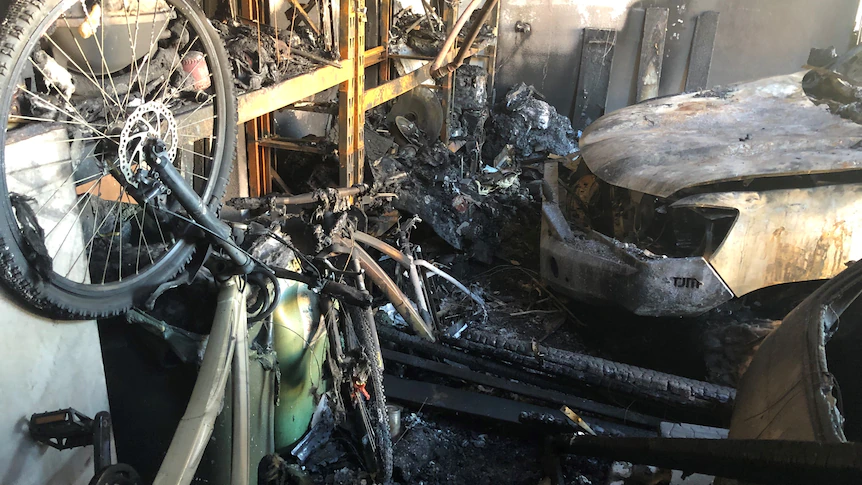As well as rapidly accelerating numbers of e-scooters and e-bikes, we’re also buying increasing numbers of household appliances such as cordless vacuum cleaners and tools, as well smart devices like phones and laptops — which are all powered by lithium-ion batteries.
At the same time, in NSW alone, fire department data shows more than 450 fires have been linked to lithium-ion batteries over the past 18 months. Equally concerning, e-scooter fires in Queensland have led to five people being hospitalised in January, while a man died during a caravan fire believed to have been started by an e-scooter battery last year.

There are many reasons lithium-ion batteries can catch fire, such as:
- overcharging: overcharging can cause the temperature of the battery to rise, leading to thermal runaway and potential ignition.
- physical damage: physical damage to the battery, such as puncturing or crushing, can also cause a short circuit and heat build-up leading to a fire.
- manufacturing defects: poorly manufactured batteries may contain structural defects that can cause a short circuit and ignition.
- internal short circuit: the internal components of the battery can sometimes fail, causing a short circuit and heat build-up.
The lack of awareness about the inherent risks associated with lithium-ion batteries has now been recognised by the Australian Competition and Consumer Commission. Australia’s consumer watchdog is looking into a range of measures that could keep us all safer, with recommendations to be announced in the middle of the year.
Reducing your risk
It’s important to note that incidents of fire are relatively rare but can be dangerous when they occur. To prevent such incidents with lithium-ion batteries, it is recommended to:
- buy only from reputable brands
- store them outside
- unplug them once charged
- take care to avoid damaging them
- do not leave them in hot environments
- use an authorised charger with correct voltage to avoid overheating the lithium-ion battery
- do not leave them in places where they are exposed to heat and moisture
- install smoke alarms close to charging locations.
What is thermal runaway?
When lithium-ion batteries fail they can experience what is called thermal runaway. This can involve an intense fire that’s difficult to extinguish, and it releases toxic, corrosive and flammable vapours and gases.
Thermal runaway is a process in which an increase in temperature causes a further increase in temperature, resulting in a dangerous and rapid rise in temperature that can lead to failure of the battery, or even a fire or explosion. This can occur in batteries when internal short circuits, overcharging, or other malfunctions cause an increase in heat generation, leading to a temperature increase that triggers further thermal runaway.
Is there a safer option?
Li-S Energy is committed to creating a safer and more environmentally-friendly alternative to lithium-ion with our new, Australian-developed lithium sulfur battery cells.
According to the Faraday Institution — the UK’s premier independent institute for electrochemical energy storage research — lithium sulfur cells offer significant safety benefits over other battery types due to their operating mechanism. Instead of using the lithium-ion battery process for energy storage, which involves hosting lithium-ions inside materials like graphite, lithium sulfur cells use a ‘conversion reaction’, forming new materials during charge and discharge, and this reduces the risk of “thermal runaway” and battery fires. While thermal runaway remains a possibility in Li-S cells, research has shown that the magnitude of this failure is significantly lower than Li-ion cells1.
In addition to our standard lithium sulfur batteries, we have also kicked off a collaborative project to develop solid state lithium sulfur cells. By eliminating flammable liquid electrolytes, this project has the potential to deliver even safer high-energy batteries for EVs, drones and electric aircraft. The project, which is supported by co-funding from project partners Deakin University and the ARC Research Hub for Safe and Reliable Energy (SafeREnergy), is being performed at Li-S Energy’s dedicated battery scale-up laboratories in Geelong, Victoria. E-scooters, e-bikes and e-skateboards are great fun and help save the planet, whether you are commuting to work or school, or riding on weekends. Enjoy them, ride safely and —because of their lithium-ion batteries — be careful to follow the safety instructions when charging. In the meantime, here at Li-S Energy we will keep working to deliver a battery that is safer, greener and increases your range, no matter what kind of EV you prefer.
- https://www.faraday.ac.uk/lis-advantages/



